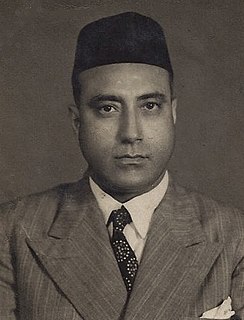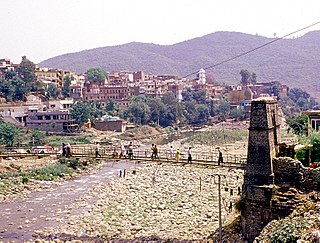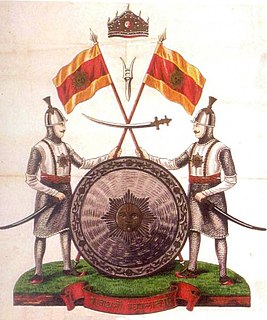The Instrument of Accession is a legal document executed by Maharaja Hari Singh, ruler of the princely state of Jammu and Kashmir, on 26 October 1947. By executing this document under the provisions of the Indian Independence Act 1947, Maharaja Hari Singh agreed to accede to the Dominion of India.

The Indo-Pakistani War of 1947–1948, sometimes known as the First Kashmir War, was fought between India and Pakistan over the princely state of Jammu and Kashmir from 1947 to 1948. It was the first of four Indo-Pakistan Wars fought between the two newly independent nations. Pakistan precipitated the war a few weeks after independence by launching tribal lashkar (militia) from Waziristan, in an effort to capture Kashmir, the future of which hung in the balance. The inconclusive result of the war still affects the geopolitics of both countries.

Hari Singh was the last ruling Maharaja of the princely state of Jammu and Kashmir in India.

Ram Chandra Kak was the Prime Minister of Jammu and Kashmir during 1945–1947. He was also a pioneering archaeologist who excavated the major sites of antiquities in Kashmir Valley and wrote a definitive treatise on them.

The Instrument of Accession was a legal document first introduced by the Government of India Act 1935 and used in 1947 to enable each of the rulers of the princely states under British paramountcy to join one of the new dominions of India or Pakistan created by the Partition of British India.

The Union of India, also called the Dominion of India, was an independent dominion in the British Commonwealth of Nations between 15 August 1947 and 26 January 1950. It was created by the Indian Independence Act 1947 and was transformed into the Republic of India by the promulgation of the Constitution of India in 1950.
The following is a timeline of the Kashmir conflict, a territorial conflict between India, Pakistan and, to a lesser degree, China. India and Pakistan have been involved in four wars and several border skirmishes over the issue.

Maharaja Gulab Singh Jamwal (1792–1857) was the founder of royal Dogra dynasty and first Maharaja of the princely state of Jammu and Kashmir, the second largest princely state in British India, which was created after the defeat of the Sikh Empire in the First Anglo-Sikh War. During First Anglo-Sikh War, Gulab Singh helped the British against the Sikhs. The Treaty of Amritsar (1846) formalised the sale by the British to Gulab Singh for 7,500,000 Nanakshahee Rupees of all the lands in Kashmir that were ceded to them by the Sikhs by the Treaty of Lahore.
Khurshid Hasan Khurshid was the Private Secretary of Muhammad Ali Jinnah, the first Governor-General of Pakistan. He was sent by Jinnah to Jammu and Kashmir in October 1947 shortly before the tribal invasion. He was arrested by Indian forces and jailed in Srinagar and finally repatriated in a prisoner exchange in 1949. He was the first elected president of Azad Kashmir. He was the founder of first Constitution of Azad Kashmir.

Rajouri or Rajauri is a town in Rajouri district in the union territory of Jammu and Kashmir, India. It is located about 155 kilometres (96 mi) from Srinagar and 150 km from Jammu city on the Poonch Highway. The town is the location of Baba Ghulam Shah Badshah University and the birthplace of Sikh General Banda Singh Bahadur.

Karan Singh is an Indian politician, philanthropist and poet. He belongs to Jamwal Dogra Dynasty is the son of Maharaja Hari Singh, and was born in Cannes, France. From 1947 he worked closely, as a teenager, with Jawaharlal Nehru, and Sardar Patel during the founding of the Republic of India, and in 1967 became the youngest ever union cabinet minister in the government of Indira Gandhi. He was the Prince regent of Jammu and Kashmir till 1952.

Justice Mehr Chand Mahajan was the third Chief Justice of the Supreme Court of India. Prior to that he was the 1st Prime Minister of Indian state of Jammu and Kashmir during the reign of Maharaja Hari Singh and played a key role in the accession of J&K to India. He was the Indian National Congress nominee on the Radcliffe Commission that defined the boundaries of India and Pakistan.

The Dogra dynasty was a Dogra Rajput Hindu dynasty that formed the royal house of Jammu and Kashmir.
Constituent Assembly of Jammu and Kashmir was a body of representatives elected in 1951 to formulate the constitution of Jammu and Kashmir. The Constituent Assembly was dissolved on 26 January 1957, based on Mir Qasim resolution it adopted and ratified on 17 November 1956.
The Constitution of Jammu and Kashmir was the legal document which established the framework for the state government of the Indian state of Jammu and Kashmir. The constitution was adopted on 17 November 1956, and came into effect on 26 January 1957. It was rendered infructuous on 5 August 2019 by an order signed by the president of India and ceased to be applicable on that date.
Pakistan officially joined the United Nations (UN) on 30 September 1947 just over a month after it came into existence. Today, it is a charter member and participates in all of the UN's specialised agencies and organisations. Pakistan has been elected seven times into the UN Security Council, with the most recent term in 2013. It is also one of the countries which has had a diplomat, Muhammad Zafarullah Khan, serve a term as the President of the United Nations General Assembly.

The history of Azad Kashmir, a part of the Kashmir region administered by Pakistan, is related to the history of the Kashmir region during the Dogra rule. Azad Kashmir borders the Pakistani provinces of Punjab and Khyber Pakhtunkhwa to the south and west respectively, Gilgit–Baltistan to the north, and the Indian union territory of Jammu and Kashmir to the east.
The term Dogra Rajput refers to a number of Dogri speaking Rajput clans found in the Jammu region and parts of Himachal Pradesh. Dogra Rajput dynasty ruled Jammu and Kashmir till 1947. Hari Singh was the last ruler of this dynasty.

In Spring 1947, an uprising against the Maharaja Hari Singh of Jammu and Kashmir broke out in the Poonch jagir, an area bordering the Rawalpindi district of West Punjab and the Hazara district of the North-West Frontier Province in the future Pakistan. The leader of the rebellion, Sardar Muhammad Ibrahim Khan, escaped to Lahore by the end of August 1947 and persuaded the Pakistani authorities to back the rebellion. In addition to the backing, Prime Minister Liaquat Ali Khan authorised an invasion of the state, by the ex-Indian National Army personnel in the south and a force led by Major Khurshid Anwar in the north. These invasions eventually led to the First Kashmir War fought between India and Pakistan, and the formation of Azad Kashmir. The Poonch jagir has since been divided across Azad Kashmir, administered by Pakistan and the state of Jammu and Kashmir, administered by India.











